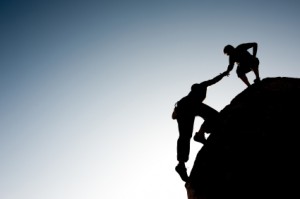My colleague, Renee Lamborn, and I sat at a local coffeehouse the other day, sipping our espresso drinks and swapping work stories. We were talking about how parents of special needs kids can feel quite isolated at times. I told her about my stepsister who has a teenager with Asperger’s. My stepsister still hasn’t met any other parents of kids with the syndrome, even after years of seeking out and using supportive services.
drinks and swapping work stories. We were talking about how parents of special needs kids can feel quite isolated at times. I told her about my stepsister who has a teenager with Asperger’s. My stepsister still hasn’t met any other parents of kids with the syndrome, even after years of seeking out and using supportive services.
Renee then told me about talking with a woman, the mother of a special needs kid, who enlisted Renee’s help as a special education advocate. The woman had been trying to advocate for her child in the school system herself and was completely overwhelmed. She felt alone and as though no one understood her. Renee’s vast experience and understanding nature helped the woman feel supported immediately. After she got off the phone with Renee, the woman burst into tears.
“What’s wrong?” her husband asked, concerned.
“Nothing is wrong,” the woman wept, “It’s just that I finally found an ally.“
I smiled. Community activator Bruce Anderson long ago taught me the importance of the ally role in working with people on the margins of society. I remember him teaching a seminar on recovery from chronic psychiatric disability at the mental health clinic where I worked at the time. He was telling a story about a group of clients who experienced severe mental illnesses and yet were doing very well in their communities.
“What do you think was the number one factor that the clients themselves named as the most important in their recovery?” Bruce asked us.
“Effective medications?” someone suggested.
“Learning social skills?” ventured another.
After several more guesses, Bruce said, “Those are all really good ideas, but the number one factor the clients pointed to was the presence of a person in their lives who believed in them and stuck with them throughout their journey with their illness.“
After Renee told me her story about the mother weeping in relief because she found someone who understood her, I smiled and felt tears welling in my eyes. I remembered the comfort I felt from my cousin who doggedly stuck by me after my partner died. I still think I probably would not have made it through without her.
Moms of special needs kids, people with chronic mental illness, and those who are lost in grief all need allies. But don’t we all? Life is about the big stuff and the little stuff, the huge mountains and deep valleys as well as the everyday rises and dips. Knowing we have an ally helps us make it through any terrain in life.
Who is your ally?
And maybe more importantly, can you be an ally for someone else?
Takeaway points: An ally is someone who will see you through the tough spots in life and stick with you. You may not see them or talk to them everyday, but just knowing they are there makes all the difference. Engaging in life requires us to both have an ally and be one to somebody else.
Looking for an ally? I’m happy to help you through life’s ups and downs. Call me at 650-529-9059 or email me for an appointment.
Leave a Reply